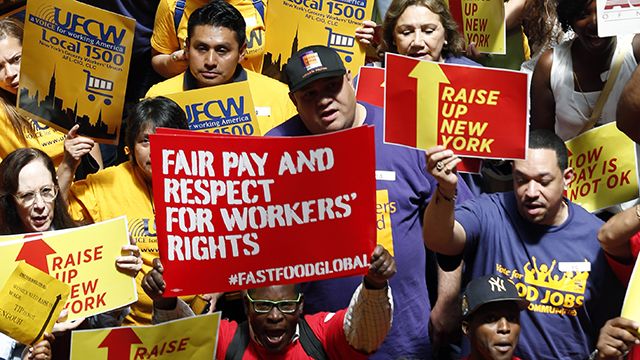This post first appeared at Demos’s PolicyShop blog.

Today’s economy doesn’t contain a lot of good news for working people. While the Great Recession officially ended five years ago, millions of Americans are still out of work and wages continue to lag. Yet this week, working people made some hugely significant gains as the fruits sowed by organizing efforts, lawsuits, legislative action — and above all, workers standing up for themselves despite tremendous risk — began to be visible.
The week’s most important victory came in a Tuesday ruling by the National Labor Relations Board which found that McDonald’s is a “joint employer” of workers at its franchised restaurants. The NLRB rightly ruled that company so closely controls and oversees its franchisees that the McDonald’s corporation, together with the franchisees, can now be held accountable for practices that violate employees’ rights. Former NLRB chairwoman Wilma Liebman was quoted in The New York Times explaining that the decision could give fast-food workers leverage to organize unions and raise wages at McDonald’s restaurants nationwide.
The upshot? Fast food workers are a big step closer to winning $15 and a union they have repeatedly gone on strike to attain. And they are energized to win the fight: at their first-ever national convention last weekend, fast food workers vowed to intensify their efforts through non-violent civil disobedience. After all, it’s clear that fast food giants like McDonald’s can well afford to pay workers more. In fact, research by my Demos colleague Catherine Ruetschlin shows that poverty wages and sky-high pay packages for executives at McDonald’s and other fast-food corporations have combined to destabilize the companies to such an extent that investors should be concerned.
Workers could also see big gains from two bills being introduced in Congress. On Wednesday, Representative Keith Ellison will introduce a bill making it easier for workers to independently take legal action against companies that violate their right to organize, without going through a slow, prolonged process with the NLRB. As it stands now, employers frequently retaliate against workers who try to form unions with impunity, illegally terminating workers in as many as one in three union elections with little consequence. Moving the process to the civil court system could speed up cases and raise penalties, giving employers greater incentives to respect workers’ legal right to organize.
Meanwhile last Wednesday, Sens. Tom Harkin and Elizabeth Warren joined Reps. George Miller and Rosa DeLauro to introduce the Schedules that Work Act, which would address the unpredictable and unstable schedules that leave many workers scrambling. The bill would mandate that employees in some industries receive schedules in advance, be paid for at least four hours on a shift, and protect workers from retaliation if they request more flexible, predictable or stable schedule from their employer. A recent Demos study examined the particularly harmful impact of emerging scheduling practices for women in the retail industry.
There is also a path for President Obama to advance workers’ rights without relying on Congress. Last week, the House Progressive Caucus sent a letter to the president calling on him to build on his executive order raising wages for contract workers by signing a new Good Jobs Executive Order. This measure would crack down on frequently unenforced violations of labor rights by federal contractors; provide a preference in contracting decisions for employers that pay a living wage and offer other basic benefits; and provide a preference in contracting decisions for employers that respect the right of their workers to collectively bargain. My colleagues Robert Hiltonsmith and Lew Daly find that using federal purchasing power in this way could improve the living standards of over 20 million Americans. This Tuesday morning workers in federal buildings in Washington, DC, walked out on strike demanding an executive order.
Additionally, this has been a big week for pro-worker legislation at the local level. San Francisco introduced a Retail Workers Bill of Rights to address the unstable schedules that make it difficult for retail workers to earn a living and plan for basic needs like child care. The city councils of San Diego, CA, and Eugene, OR, approved measures to guarantee workers paid sick days. If the bills become law, it would mean that more than 300,000 additional workers gain the right to take up to five paid sick days a year, according to the National Partnership for Women and Families. Meanwhile, workers in New York City can start using sick time they have earned starting July 30. New York’s law extended sick leave to an estimated 1.2 million working people who previously had no access to paid time off the job to recover from illness.
Throughout the economy, job growth has been picking up and long-term unemployment is finally beginning to fall, while 10 million previously uninsured Americans now have health coverage — the benefits of an older legislative fight that could still be stripped away all too easily.
There’s no question that we’ve still got a long way to go: preliminary rulings and bills introduced are not the same as laws passed, rights won, or paychecks in workers’ pockets. But it’s good to savor incremental victories — and prepare to build on them.


